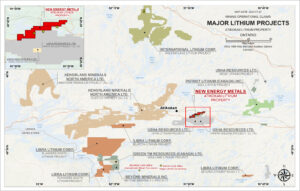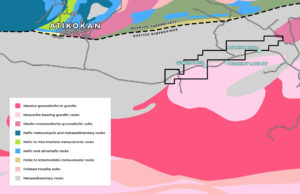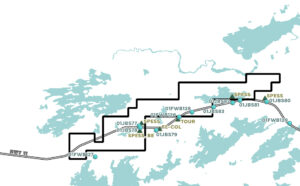Overview
The highly prospective Atikokan Lithium Property consists of 4 mining claims comprising 3,788 hectares and is located approximately 12 km east of Atikokan, Ontario.

Regional location of the Atikokan lithium property
Geology
The claims straddle the contact between a peraluminous S-type muscovite-bearing granite and metasediments within the Quetico subprovince. The Quetico-Marmion subprovincial boundary lies just 4 km north of the Property. Numerous lithium deposits of northwestern Ontario occur proximal to a subprovincial boundary (Breaks et al., 2003). Muscovite-bearing pegmatite dykes and small pegmatitc granite masses are widely exposed along Highway 11 between Nym Lake Road junction and west to Niobe Lake (McIlwaine and Larsen 1981a, 1981b). Historically, the Atikokan area has documented strongly anomalous lake sediment results in Li, Rb, Cs, Ga and Sn (Jackson, 2001).

Regional geology of the Atikokan lithium property
Historical Exploration

Bulk sample locations by Breaks et al., 2003
For the rare alkali metals, cesium was significantly enriched 7 to 25 times above its mean crustal abundance for 80% of the data population and varied from 3.9 to 80 ppm. Many values exceeded 15 ppm, a level considered by Černý and Meintzer (1988) to indicate significant fractionation in granitic systems. Rubidium had a range of 5 to 534 ppm and mean content of 270 ppm.
In essence, Breaks et al., 2003 summed up their reconnaissance prospecting and mapping with: “The anomalous Li, Rb, Cs, Sn and Ga documented in the bedrock by this survey corroborate the earlier lake sediment geochemistry work of Jackson (2001). Exploration for rare-element mineralization in the area should therefore focus on the numerous lake sediment anomalies for these metals in the general area as there is a close correlation with bedrock chemical data at least in the Nym-Niobe lakes area. The discovery of columbite-tantalite group minerals and beryl by this survey gives strong indications that, with careful prospecting, further rare-element minerals may be discovered. The presence of elevated Ta contents in bulk muscovite at localities 01-FWB-126 and 01-JBS-81 suggests that they should be investigated further for possible tantalum mineralization”.

